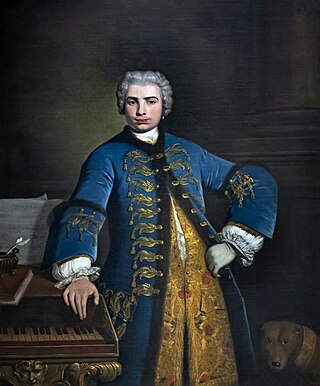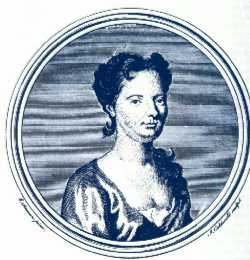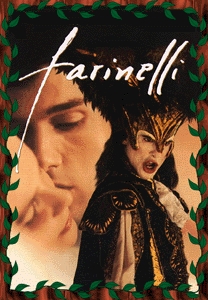Related Research Articles

Farinelli was the stage name of Carlo Maria Michelangelo Nicola Broschi, a celebrated Italian castrato singer of the 18th century and one of the greatest singers in the history of opera. Farinelli has been described as having had soprano vocal range and as having sung the highest note customary at the time, C6.

Francesco Bernardi, known as Senesino, was a celebrated Italian contralto castrato, particularly remembered today for his long collaboration with the composer George Frideric Handel.

NicolaAntonio Porpora was an Italian composer and teacher of singing of the Baroque era, whose most famous singing students were the castrati Farinelli and Caffarelli. Other students included composers Matteo Capranica and Joseph Haydn.

Francesca Cuzzoni was an Italian operatic soprano of the Baroque era.

Atalanta is a pastoral opera in three acts by George Frideric Handel composed in 1736. It is based upon the mythological female athlete, Atalanta, the libretto being derived from the book La Caccia in Etolia by Belisario Valeriani. The identity of the librettist is not known.

Faramondo, HWV 39, is an opera in three acts by George Frideric Handel to an Italian libretto adapted from Apostolo Zeno's Faramondo. The story is loosely based upon the legend of Pharamond, a mythological King of the Franks, circa 420 AD, and the early history of France. The opera had its first performance at the King's Theatre, London, on 3 January 1738.

Oreste is an opera by George Frideric Handel in three acts. The libretto was anonymously adapted from Giangualberto Barlocci’s L’Oreste, which was in turn adapted from Euripides' Iphigeneia in Tauris.

Arianna in Creta is an opera seria in three acts by George Frideric Handel. The Italian-language libretto was adapted by Francis Colman from Pietro Pariati's Arianna e Teseo, a text previously set by Nicola Porpora in 1727 and Leonardo Leo in 1729.

Farinelli is a 1994 internationally co-produced biographical drama film directed by Gérard Corbiau and starring Stefano Dionisi, Enrico Lo Verso, Elsa Zylberstein, and Jeroen Krabbé. It centers on the life and career of the 18th-century Italian opera singer Carlo Broschi, known as Farinelli, considered the greatest castrato singer of all time; as well as his relationship with his brother, the composer Riccardo Broschi.

Antonio Montagnana was an Italian bass of the 18th-century who is best remembered for his association with the composer George Frideric Handel, in whose operas Montagnana sang.

The Handel organ concertos, Op. 4, HWV 289–294, are six organ concertos for chamber organ and orchestra composed by George Frideric Handel in London between 1735 and 1736 and published in 1738 by the printing company of John Walsh. Written as interludes in performances of oratorios in Covent Garden, they were the first works of their kind for this combination of instruments and served as a model for later composers.
Francesca Bertolli was an Italian contralto of the 18th century. She is best remembered for her association with the composer George Frideric Handel, in whose operas she sang.

The Royal Academy of Music was a company founded in February 1719, during George Frideric Handel's residence at Cannons, by a group of aristocrats to secure themselves a constant supply of opera seria. It is not connected to the London conservatoire with the same name, which was founded in 1822.

Carlo Scalzi was an Italian castrato who had an active performance career in major opera houses in Italy from 1718-1738. He was also heard in London in 1733–1734 where he notably created the role of Alceste in the world premiere of George Frideric Handel's Arianna in Creta. The librettist Pietro Metastasio described Scalzi as a "very unique (sic) singer" and likened his voice to that of the famous castrato Farinelli.

Parnasso in festa, per li sponsali di Teti e Peleo, by George Frideric Handel, is a festa teatrale, a form also called a "serenata", a type of Italian opera intended as entertainment to celebrate a festive royal or state occasion. The work was written to celebrate the marriage of Anne, Princess Royal and Prince William of Orange. Parnasso in festa had its first performance in London at the King's Theatre on 13 March 1734 and was repeated five times. The operatic entertainment, to an anonymous libretto, was such a success at its London premiere that although it was intended as a one-off production for a royal wedding, Parnasso in festa was revived by Handel in several subsequent seasons.

Carlo Arrigoni was an Italian composer and musician who was active in several countries during the first half of the 18th century.

Maria Caterina Negri was an Italian contralto who created numerous roles in 18th-century operas, including many by George Frideric Handel. She primarily portrayed male characters en travesti or female warriors such as Bradamante. Negri was born in Bologna and made her debut there at the age of 15. Her last known performance was in 1744. The date and place of her death are unknown. In its prime, her voice was known for its agility and wide vocal range.

Arianna in Nasso is a 1733 opera by Nicola Porpora to a libretto by Paolo Rolli, chief conductor of the Opera of the Nobility.
Celeste Gismondi, originally known as Celeste Resse and nicknamed La Celestina, was an Italian soprano opera singer, who performed a major role in the première of some works by George Frideric Handel, including Orlando.

Polifemo is an opera in three acts by Nicola Porpora with a libretto by Paolo Rolli. The opera is based on a combination of two mythological stories involving the cyclops Polyphemus: His killing of Acis and his blinding by Ulysses.
References
- ↑ Sadie, Stanley; Tyrrell, John, eds. (2001). "Nobility Opera". The New Grove Dictionary of Music and Musicians (2nd ed.). London: Macmillan. ISBN 978-1-56159-239-5.[ full citation needed ]